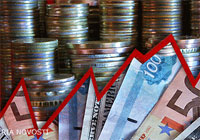Putin’s Frustration Grows as Russia’s Economy Slumps

(Bloomberg – bloomberg.com – Leonid Bershidsky – May 23, 2013) President Vladimir Putin’s popularity throughout much of Russia is founded on an implicit social compact: People have given up some freedom in return for economic prosperity.
Now, Putin’s authoritarian ways could be killing the economic growth that has helped keep him in power.
Time and time again, Russia’s leaders have pledged to restructure the country’s economy, making it less dependent on oil and gas. In an interview this week to mark the first anniversary of his move to the prime minister’s job from the presidency, Dmitri Medvedev effectively admitted failure. “We must change the structure of our economy,” he told the popular daily Komsomolskaya Pravda. “In the past 13 to 14 years we just did not have enough time to do it.”
Medvedev might not get another chance: A sharp economic deceleration has put his government on the defensive. Official statistics show growth declining to an annualized rate of 1.6 percent in the first three months of 2013, the slowest pace since the 2009 crisis. Eduard Baranov, an economist at the Higher School of Economics, has even suggested that Russia might already be in recession: An indicator measuring the output of the economy’s eight largest sectors has been declining since October. The price of Russia’s export oil blend, Urals, was down 14 percent in April from a year earlier, according to the Finance Ministry. Capital flight reached $25.8 billion in the first three months of 2013, up from only $7.9 billion in the fourth quarter of 2012, according to the central bank.
Putin’s response has been to demand a solution from the government. The relevant minister, Igor Shuvalov, promised to deliver a plan to speed up growth by May 15, but none has so far been made public. At a meeting to formulate a strategy, government officials reached no common ground except on some general points such as stepping up investment in railroad and highway construction and offering more backing for small and medium businesses, according to the newspaper Vedomosti. The Economics Ministry suggested that the central bank take the lead by loosening monetary policy and setting up a system of indicative loan rates for private banks.
The problems of Russia’s economy, though, go far deeper than a lack of stimulus. In an opinion piece for Vedomosti, the economists Sergei Guriev of the Russian Economic School and Aleh Tsyvinski of Yale University identified corruption and a poor investment climate as major structural factors holding the country back. “Further growth would require new sources such as productivity growth and new investment,” they wrote. “That, in turn, requires the protection of property rights, an effective and independent judiciary and fair competition.”
Putin has expressed his frustration in bizarre ways. On May 20, security guards at the president’s residence in the resort city of Sochi tried to keep Deputy Prime Minister Arkady Dvorkovich, a long-standing Medvedev ally, from entering because he was not on the list of invitees. Reporters from the pro-Putin website Life.ru were conveniently on hand to record the humiliating incident. Earlier, Dmitri Kiselev, who hosts a news program on the state-controlled Rossia 2 television station, characterized Putin as a displeased parent: “He is like a father who sees his kids all muddy and has to decide whether to give these ones a proper washing or make new ones.”
Although Putin might not fire Medvedev, who paid his dues by keeping the presidential seat warm until Putin’s return last year, he clearly wants the cabinet to take the blame for any malaise to come. Many Russian analysts and businesspeople, however, see the culprit elsewhere.
“The problem is purely political,” Oleg Zamulin, an economist at the Higher School of Economics, told the website banki.ru. “I would start by bringing back the freedom of speech, electoral freedoms, a working parliament, local self-government.”
Pragmatic businesspeople would settle for smaller steps. Boris Titov, Russia’s business ombudsman, is pushing for a sweeping amnesty of 13,000 entrepreneurs convicted of various economic crimes. Many of them end up in jail because their competitors or former partners pay off someone in law enforcement to get them out of the picture.
“Most of them are in prison for larceny,” Titov told the Russian News Service. “Entrepreneurs have even been charged with it for breach of contract.”
Titov’s supporters in the business community and in parliament believe an amnesty would improve the economic climate and demonstrate the Kremlin’s goodwill toward investors. If Putin agrees, it could do more for the economy than easy monetary policy and infrastructure projects combined.
Leonid Bershidsky, an editor and novelist, is Moscow correspondent for World View.
Article ©2013 BLOOMBERG L.P. ALL RIGHTS RESERVED. Article also appeared at http://www.bloomberg.com/news/2013-05-23/imprisoned-entrepreneurs-and-russia-s-economic-slump.html
